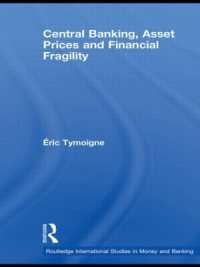Full Description
As China and Chinese language learning moves centre stage economically and politically, questions of interculturality assume even greater significance. In this book interculturality draws attention to the processes involved in people engaging and exchanging with each other across languages, nationalities and ethnicities.
The study, which adopts an ecological perspective, critically examines a range of issues and uses a variety of sources to conduct a multifaceted investigation. Data gathered from interviews with students of Mandarin sit alongside a critical discussion of a wide range of sources.
Interculturality in Learning Mandarin Chinese in British Universities will be of interest to students and academics studying and researching Chinese language education, and academics working in the fields of language and intercultural communication, intercultural education and language education in general.
Contents
Contents
Chapter 1 Introduction: Interculturality and the learning of Mandarin Chinese
Key themes and perspectives of interculturality
The contextual perspective
'Small cultures'
A critical turn
Chinese language studies
Researching interculturality through perspectives of students of Chinese
Thinking ecologically
The research undertaken
Structure of the book
References
Chapter 2 Changing ideologies, institutions and contexts: the rise of Chinese and 'foreign' language policy
Interculturality and ideology
Developments in wider contexts
British Chinese and Chinese residents and visitors in the UK
Initiatives at school level
Hanban and the Confucius Institute
UK 'Foreign' language policy
On-going concerns about national language capabilities
HEFCE initiatives on Chinese studies
The rise of China and Mandarin Chinese
Emerging theme of 'intercultural'
Concluding remarks
References
Chapter 3 Changing ideologies, institutions and contexts: university students, courses and textbooks
The changing ideology of learning Chinese: students' perspectives
Developments of the teaching and learning of Chinese within British universities
University provision of Chinese languages courses in the UK
Approaches to teaching cultural elements
Chinese language learning materials
Authors and learning materials in geo-historical context
Ideological influences of textbooks
Critical views of students
Examples of textbooks of Chinese
A different approach
Concluding remarks
References
Chapter 4 Moving towards interculturality: Students' understandings of 'culture'
Interculturality and the concept of 'culture'
Critical reflections on 'Chinese culture'
Evolving understandings of the concept of 'culture'
Moving towards 'interculturality'
Researching cultural specifics with students
Cultures, languages, dialects - Mixed multilingual and multicultural landscapes
Students' perspectives to culture-related questions
Developing critical cultural awareness
Concluding remarks
References
Chapter 5 Emerging identities: Students as 'intercultural individuals'
Interculturality and identity
Cultural self-awareness
The 'intercultural individual'
The Chinese language identity of learners
Concluding remarks
References
Chapter 6 Moving beyond 'intercultural competence': Students talk about their learning experience
Interculturality and intercultural competence
Intercultural responsiveness
Respect and transnational cooperation
Decentring perspectives
Decentring of cultural prejudices and assumptions
Adopting global perspectives
Attitudes toward learning the local language
Concluding remarks
References
Chapter 7 An intercultural approach to teaching and learning Chinese
Interculturality and intercultural education
Education ideologies on language teaching and learning
The role of culture in an intercultural approach to teaching and learning Chinese
Including cultural and intercultural elements: Perspectives of students and lecturers
Acquiring language proficiency as the primary goal
The translation-grammar approach and beyond
Individual autonomy in the use of teaching approaches
A focus on learning process and teacher-student relationships
Openness to interpretation and learning
Ethnographic approach
Concluding remarks
References
Chapter 8 Conclusion: Looking to the future
Complexity of the field of study
Changing ideologies
Moving beyond 'intercultural competence'
Cultural understanding and identity
Taking account of disruption, confusion and challenges
Intercultural individuals, superdiversity and translanguaging
Legacy of orientalism and promoting a decentred view
Intercultural approach and British universities
Interculturalization of higher education and student mobility
Perspectives derived from other languages
Looking to the future
Implications for university courses
Support for lecturers
Governmental and institutional policy implications
References
Abbreviations
Appendix - Biographical details of student interviewees
Index







